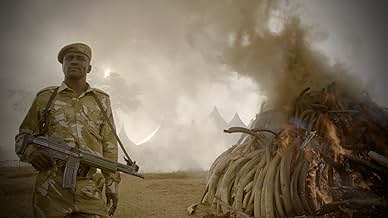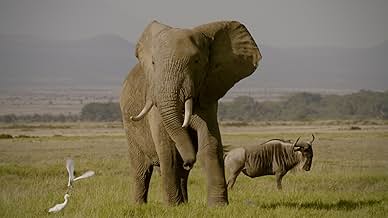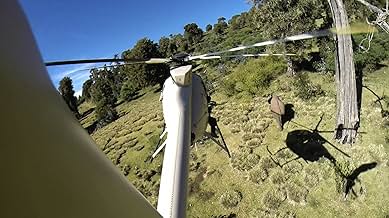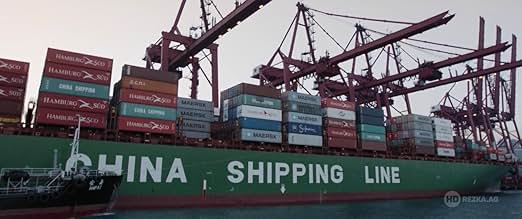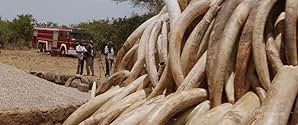IMDb-BEWERTUNG
7,8/10
3584
IHRE BEWERTUNG
Wildtieraktivisten auf der Spur von Wilderern, um den illegalen Handel mit Elfenbein in Afrika zu beenden.Wildtieraktivisten auf der Spur von Wilderern, um den illegalen Handel mit Elfenbein in Afrika zu beenden.Wildtieraktivisten auf der Spur von Wilderern, um den illegalen Handel mit Elfenbein in Afrika zu beenden.
- Auszeichnungen
- 7 Gewinne & 7 Nominierungen insgesamt
Empfohlene Bewertungen
This gets a passing grade because it's an important subject and has some compelling moments, but as a film, I thought this was quite weak, or at least lacking.
I got the sense that a great deal of footage was shot around a broad subject, without much in the way of structure or narrative planned ahead, and then the finished film came together in the editing. There are a few stories going on at once, and while the interviews and editing do their best to connect it all, but I didn't buy it. It felt less like a full feature film and more like watching a 6-part miniseries where you only catch 20 minutes of the first episode, 20 minutes of the second, and so on.
Hunting an endangered species like the elephant only for their ivory is terrible, and I admire the people in this film for devoting themselves to making it a thing of the past. It's important to expose the individuals and institutions who allow such a trade to happen, and if this film has changed the world at large for the better, then it deserves praise. But if you want a story, or something that progresses in a logical fashion, or just something that's compelling in a way that the best documentaries out there are, you may not find it with The Ivory Game.
Despite featuring competent visuals, music, and knowledgeable interviewees, it doesn't flow at all and is surprisingly unengaging. It's a noble film and overall not a terrible one; more just one that isn't very involving or exciting. If it sounds really up your alley, I could give it a hesitant recommendation, but otherwise I'd say go watch any of the other 5,000,000 documentaries currently on Netflix.
I got the sense that a great deal of footage was shot around a broad subject, without much in the way of structure or narrative planned ahead, and then the finished film came together in the editing. There are a few stories going on at once, and while the interviews and editing do their best to connect it all, but I didn't buy it. It felt less like a full feature film and more like watching a 6-part miniseries where you only catch 20 minutes of the first episode, 20 minutes of the second, and so on.
Hunting an endangered species like the elephant only for their ivory is terrible, and I admire the people in this film for devoting themselves to making it a thing of the past. It's important to expose the individuals and institutions who allow such a trade to happen, and if this film has changed the world at large for the better, then it deserves praise. But if you want a story, or something that progresses in a logical fashion, or just something that's compelling in a way that the best documentaries out there are, you may not find it with The Ivory Game.
Despite featuring competent visuals, music, and knowledgeable interviewees, it doesn't flow at all and is surprisingly unengaging. It's a noble film and overall not a terrible one; more just one that isn't very involving or exciting. If it sounds really up your alley, I could give it a hesitant recommendation, but otherwise I'd say go watch any of the other 5,000,000 documentaries currently on Netflix.
Very good about an unspoken problem, we live in a world where people care more about how they look and what they can buy than actually solving real problems we create.
Documentary film seen on the 10th to the 11th of March 2021.
Documentary film seen on the 10th to the 11th of March 2021.
First of all, this is a very well made documentary and you can notice that from the first shot. Directors Kief Davidson and Richard Ladkani have done a really great job in putting the pieces of ivory trade together in a very comprehensible narrative that exposes the whole circle of the game.
We get to know the whole infrastructure behind it, from local killers working for local dealers, to foreign dealers and (usually Chinese) wealthy buyers. The cinematography of it is breathtaking as we are taken to visit the natural habitat of Elephants in South East Africa and meet the people who try to protect them against all odds and overwhelmingly lack of resources. We get to know the enthusiastic wildlife conservationists working in Tanzania, Uganda, Zambia and get to know their motivation for fighting poachers and the whole illegal network. We get to know the man behind Wildleaks - an organization that leak the information about that network and we go undercover with them to meetings with dealers in China.
The whole documentary feels like a first class thriller with chase footage of the poachers and undercover agents risking their lives to expose the wide network, except this one is a reality.
Although one small minus for me was that not enough (in my opinion) was said about how complex,intelligent and emotional animals Elephants are. I mean they can paint, they visit spots where their members were killed or died and mourn the dead bones together, which we could consider as a form of ritual. They are able to use tools (although on lower level than chimps). Together with dolphins and apes they exhibit forms of self-recognition and they have an excellent memory.
Although elephants also cause some problems to people, especially in Asia where urbanization and human population claimed a lot of their natural habitats, the massive genocide of elephants for their ivory is a sign of something much larger than just ivory black market. It's a sign of expansion of human destructive relationship to our natural environment. We don't respect the nature as is documented by the global warming, and we don't give a sh*t about animals as they're mostly seen only as a necessary decoration of ever-shrinking wild nature.
I think this is a symbol of our addiction to power. We want to prove ourselves that we are the Gods and rulers of this planet and due to that addiction we are about to see some nasty results of that urge. Like there will be no elephants on the planet in few decades to come and more and more wild life territories will be sacrificed, so we will only know about the diversity of life from the history books. What kind of psychological effect will that have on future generation we can only speculate.
We get to know the whole infrastructure behind it, from local killers working for local dealers, to foreign dealers and (usually Chinese) wealthy buyers. The cinematography of it is breathtaking as we are taken to visit the natural habitat of Elephants in South East Africa and meet the people who try to protect them against all odds and overwhelmingly lack of resources. We get to know the enthusiastic wildlife conservationists working in Tanzania, Uganda, Zambia and get to know their motivation for fighting poachers and the whole illegal network. We get to know the man behind Wildleaks - an organization that leak the information about that network and we go undercover with them to meetings with dealers in China.
The whole documentary feels like a first class thriller with chase footage of the poachers and undercover agents risking their lives to expose the wide network, except this one is a reality.
Although one small minus for me was that not enough (in my opinion) was said about how complex,intelligent and emotional animals Elephants are. I mean they can paint, they visit spots where their members were killed or died and mourn the dead bones together, which we could consider as a form of ritual. They are able to use tools (although on lower level than chimps). Together with dolphins and apes they exhibit forms of self-recognition and they have an excellent memory.
Although elephants also cause some problems to people, especially in Asia where urbanization and human population claimed a lot of their natural habitats, the massive genocide of elephants for their ivory is a sign of something much larger than just ivory black market. It's a sign of expansion of human destructive relationship to our natural environment. We don't respect the nature as is documented by the global warming, and we don't give a sh*t about animals as they're mostly seen only as a necessary decoration of ever-shrinking wild nature.
I think this is a symbol of our addiction to power. We want to prove ourselves that we are the Gods and rulers of this planet and due to that addiction we are about to see some nasty results of that urge. Like there will be no elephants on the planet in few decades to come and more and more wild life territories will be sacrificed, so we will only know about the diversity of life from the history books. What kind of psychological effect will that have on future generation we can only speculate.
The documentary explores operations of poachers in Africa and further trafficking of illegal ivory to Asia where it is sold to local wholesalers who subsequently can deliver it to your doorstep a 'nominal' fee. The undercover footage gives the documentary great validity and evidential basis. Must be watched - thought-provoking and horrifyingly real.
This is a must see documentary about the desperate battle to save the elephant from extinction, and at the same time save some remnants of the beautiful natural heritage of a planet for future generations. We say we love our children, but what kind of world are we leaving them. See the front line defenders of these majestic beasts in some of Africa's leading game parks, as well as dedicated investigators and campaigners around the world, bravely trying to stop the criminal and barbaric syndicates from plying their deadly trade.
Wusstest du schon
- WissenswertesThe twenty-ninth Netflix original documentary.
Top-Auswahl
Melde dich zum Bewerten an und greife auf die Watchlist für personalisierte Empfehlungen zu.
- How long is The Ivory Game?Powered by Alexa
Details
Box Office
- Weltweiter Bruttoertrag
- 105 $
- Laufzeit
- 1 Std. 52 Min.(112 min)
- Farbe
Zu dieser Seite beitragen
Bearbeitung vorschlagen oder fehlenden Inhalt hinzufügen


